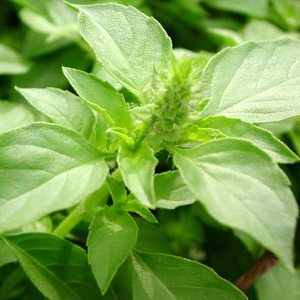
Holy Basil

Herb Info
Is a prime herb in the Ayurvedic treatment for common colds, stomach disorders, inflammation, heart disease, various forms of poisoning. It is adaptogenic and helps to restore balance in the body.
Herb Description
BIOComplete Organic Holy Basil (Tulsi) Leaves
Also known as: Ocimum sanctum, Tulasi (Sanskrit name)
Introduction: Holy Basil is commonly grown in Hindu homes and it is a sacred plant in the Hindu religion. In fact a Hindu household is considered incomplete if there is not a Tulsi plant in the courtyard. Native to India, it grows wild in Asia and Malaysia, and has a long tradition of use in ayurvedic medicine, where it is considered the most sacred herb in India. Devotees of Vishnu may wear necklaces made of Tulsi seeds because it is written that it is the plant that pleases him the most. It is also written that Tulsi was the incarnation of a princess who fell in love with the Lord Krishna, but had a curse laid upon her by his consort Radha. The Latin name Ocimum sanctum means "sacred fragrant lipped basil" or "the incomparable one". Holy Basil has also been called by many other names including the "Queen of Herbs", "The Elixir of Life", and the "Mother Medicine of Nature". Ayurvedic medicine teaches that Tulsi is classified as a "Rasyana": an herb that nourishes a person's growth to perfect health and promotes long life. There are three distinct varieties of Tulsi: Vana, which grows wild in the forests, Krishna, which is entirely purple, and Rama, the most commonly found type.
Constituents: Eugenol app., B-caryophyllene, sesquiterpenes, monoterpenes viz, ?-pinene, ?-sitosterol, ? -elemene, bornyl acetate, methyleugenol, neral, camphene, a-pinene, ursolic acid, campesterol, cholesterol, stigmasterol, and methyl esters of common fatty acids.
Parts Used: The leaf is generally the only part used in a medicinal capacity.
Typical Preparations: Tulsi is traditionally taken as an herbal tea, dried powder, fresh leaf, or mixed with ghee.
Summary: Holy Basil, or Tulsi, is an important symbol in the Hindu religion and it is a significant herb in ayurvedic medicine. Holy Basil has been used for thousands of years as a prime herb in ayurvedic treatment, and is mentioned in the Charak Samhita (the central teaching of ayurvedic medicine) which was written at least two thousand years ago. In India, Hindus grow Tulsi as a religious plant in their homes and temples, and the leaves are an important part of their meditation and worship. Holy Basil is used in ayurvedic medicine for common colds, headaches, stomach disorders, inflammation, heart disease, various forms of poisoning, and malaria. Holy Basil is considered an adaptogen, which means that it assists the body adapt to stress (environmental, physical, or chemical), restore balance in the body, and normalize body functions. It is currently being studied for its beneficial properties and has been found to be effective for cancer, diabetes, high cholesterol levels, stress, wound healing, the immune system, inflammations, liver support and protection, hypoglycemic conditions, ulcers, digestion, chronic fatigue syndrome, arthritis, radiation poisoning, cataracts, the memory, respiratory system, urinary problems, eczema, psoriasis and other skin conditions, and it is an antioxidant.
Precautions: Not recommended for use if pregnant, nursing, or are considering becoming pregnant (may have an anti-fertility effect). Do not administer to the very young. May lower blood sugar, consult a doctor if hypoglycemic (in separate studies, it has also been shown to be beneficial for those with hypoglycemia). Holy Basil has mild blood thinning properties.
This information has not been evaluated by the Food and Drug Administration.
This information is not intended to diagnose, treat, cure, or prevent any disease.
For educational purposes only.

